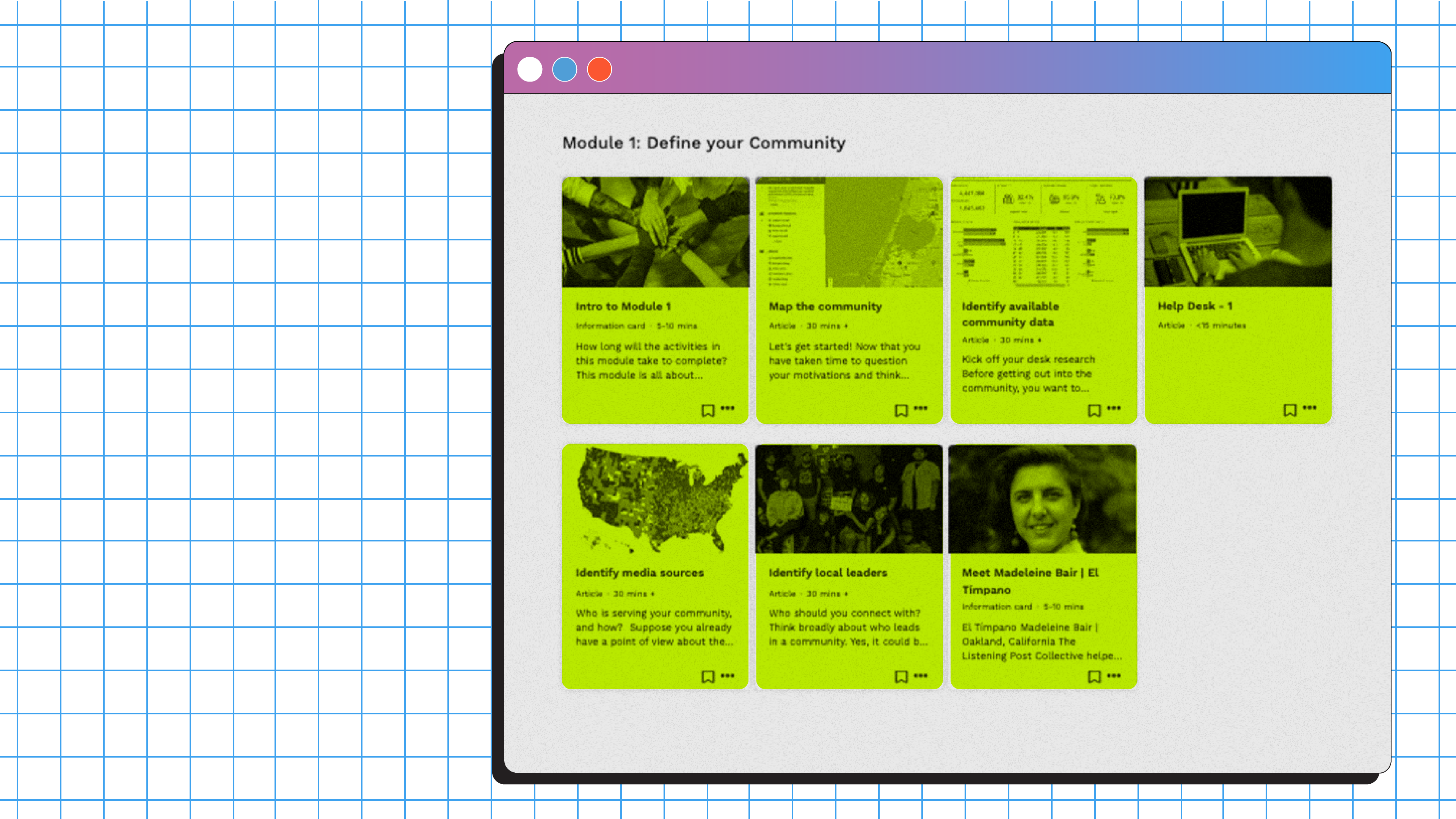The LPC Playbook
Guided DIY Civic Media Playbook
for Community-Led Projects
With the right support, civic media projects can thrive in any community. Our Civic Media Playbook is a free, self-paced, online platform that walks users step-by-step through the process of a community-led information ecosystem assessment. We also offer tools, financial support, and establish a peer network to help community members identify gaps and launch civic media projects.
Click the link in the blue box below to sign-up.
How to Access the Playbook
The video below provides a detailed tutorial on how to log-in to the Playbook
Access the tools, resources, and mentorship you need to start your own civic media project through the Internews Studio. Start sign-up below.
If you have any trouble logging in, reach out to [email protected]
Key Benefits
Five Digital Modules
Our five easy-to-follow digital playbook modules include tactics for launching your civic media project, case studies, discussions, and engagement prompts that you can complete at your own pace.
Our Civic Media Design process follows a three-pronged approach: Listen to communities to understand their information needs, Seed local civic media partnerships, and Cultivate these relationships to build power and resilience.
Phase One Listen – Modules 1-3: Walks you through the process of creating your own Information Ecosystem Assessment
Phase Two-Seed -Module 4: Once you have a better understanding of your community’s information needs, we will introduce you to approaches you might take in launching your own civic media project.
Phase Three-Cultivate-Module 5: Asks you to consider the many ways you can use civic media to build civic power
Qualify for a Micro-grant
Are you using this playbook to launch a project that serves a BIPOC or immigrant community?
Users are eligible for up to $30,000 to support their Playbook-guided work. The ranges vary depending on which Phase of the Playbook they are applying for financial support, and the budget and needs of the individual or organization. We typically offer up to $10,000 per phase. See details below:
- Phase One (Listen) Modules 1-3: For efforts to complete modules 1-3 and conduct a community-led Information Ecosystem Assessments (IEAs) to understand local information needs. These funds can be used for community listening sessions, designing surveys, supporting staff, or any other activities assisting in the development of an
- Phase Two (Seed) Module 4: For civic media programming guided by community-led IEAs. This can be used to support new civic media programming that addresses community needs using a variety of platforms or approaches, but it must be rooted in community listening. If this is used to strengthen an existing project, there must be evidence of the existing project being rooted in a community listening exercise.
- Phase Three (Cultivate) Module 5: For programming to support building power and sustainability in your work. This could range from supporting inclusive fundraising strategies (Patreon, local pledge drives, etc.) or help you plan and execute a community event to promote exposure and get community support. Other possible activities include establishing ongoing inclusive community workshops around media literacy, journalism, and civic engagement. If you have another idea for how this funding can support your work, please reach out, we’d love to hear it!
When can I apply?
- Applications for micro-grants will be reviewed as they are received.
- All applicants will receive a response within two weeks.
- The application link is found within the digital learning platform.
Who is eligible for our microgrants?
- Any person, project, or organization, based in the U.S., with budgets under $500k, dedicated to impacting their communities is eligible to apply.
- Fiscally-sponsored organizations (non or for-profit) may apply; smaller projects that are responsible for their own fundraising as part of a larger organization will also be considered.
- Ineligible programs include religious groups for religious purposes, political organizations/lobbying, fundraising events, elected officials, or organizations that do not align with our values.
Do I need to do any reporting?
- We will ask for a short evaluation at the end of the grant term.
- Per our policy, we will require a simple reporting form for financials.
*LPC continuously works on fundraising to keep our micro-grant pool filled. However, there might be times when funds are limited. We are committed to awarding as many micro-grants as our funds allow. Remember, besides fitting the eligibility criteria, grants are given on a first-come-first-serve basis. Also, certain conditions from our funding partners might impact the grant distribution.
LPC Coaching & Mentorship
Access to LPC coaches + and a sounding board of peers from across the country trying to do good work too.
Community Roadmap
This roadmap, also known as an Information Needs Assessment, will not only help you understand your community needs but will you understand how to best deliver news and information to the people that need it most.

